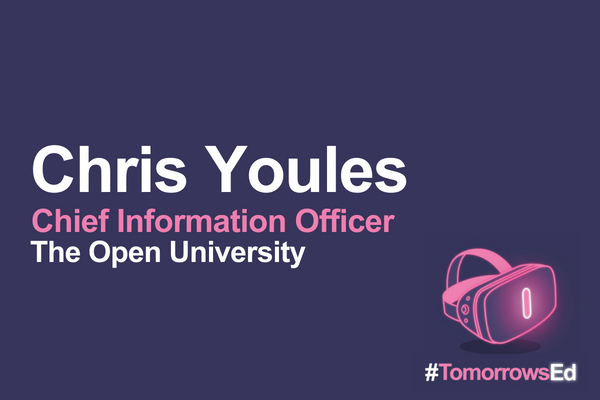Technology is moving at a faster pace than ever before. Acknowledging this, and how all of us use technology, is vital to continued progress. Whether it’s how we deliver teaching and exams, or how we manage our finances; technology is involved in some way. Moving into the world of tomorrow means that technology will lead change for all of us and we need to embrace it, writes Chris Youles, Chief Information Officer at The Open University.
One particular area of fast progress is the use and benefits of AI in education. From supporting individual learners with personalised study routes, or helping people with autism; AI has an important role to play. “Human plus machine isn’t the future, it’s the present,” Garry Kasparov said in a recent TED talk.
Start swiping
Children don’t question how to use a tablet – they just pick one up and start swiping. Coding is becoming part of national curricula around the world. Technology is present in every nursery room.
A recent report by Pearson states how artificial intelligence will positively impact education in future years. One of the possible uses stated involves new forms of assessment that measures learning while it occurs, therefore influencing the learning experience of students directly.
Another way of looking at the learning experience is not to think about measurement but focus purely on the learning.
“We are moving away from simply ‘learning’ a subject or topic to ‘feeling’ the content. This is not simply an engagement tool or a gimmick, it allows a student to explore, to experience or to be involved in something, as if they are actually present in that environment or place,” Graeme Lawrie, Director of Innovation and Outreach at the U.K.-based Sevenoaks School.
How would a student feel if they could walk around the wreck of the Titanic using Virtual Reality as opposed to simply reading about the wreck?
Not a silver bullet
There are also significant opportunities to improve learning experiences for people with autism through the improved use of technology. Recent studies show that communication and social skills can improve by almost 30% through the use of AI and robots for children with autism. The more we can improve the learning of children, the more chance there is of them extending their learning into higher education.
Artificial Intelligence, Virtual Reality and other technology advances are not a silver bullet for all education challenges, but we shouldn’t ignore the strengths and opportunities new technology advances can bring. All of us have a part to play in how technology shapes the future, and how much of it we choose to adopt. Whatever we opt for, technology will still be leading the pace of change.



